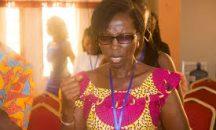Chasing the ghosts out of the national pension payroll

A ghost is an apparition of a dead person which is believed to appear or become manifest to the living, typically as nebulous image. It is the soul of a dead person believed to be an inhabitant of an unseen world or to appear to the living in bodily likeness. The word ghost has been corrupted and used in our everyday life. For example, we often hear of ghost names that have found their way into payrolls of public institutions and workplaces, resulting in the loss of huge sums of revenue at the expense of the nation. Moneys are paid to faceless people as a result of negligence on the part of officials who manage the public purse, thereby causing financial loss to the state.
HUGE AMOUNT RECOVERED FROM GHOST NAMES
Recently, Ghanaians were told that the Social Security and National Insurance Trust (SSNIT), in an aggressive drive to rid its books of ghost pensioners, has raked in over GH¢320 million savings which otherwise, would have gone to ghosts or faceless beneficiaries of the Pension Scheme who had passed on without their knowledge. According to the Director-General of SSNIT, Dr John Ofori-Tenkorang, the amount which had been withheld since 2018, covered the category of deceased pensioners whose guaranteed pensions entitlement had been exhausted.
“For persons who are on PNDC Law 247, that is the age of 72 and pensions on Act 766, that is the age 75…but at the moment, no pensioner who is on Act 766 is that old because, they recently just started going on pension. Every year, we have to ensure that pensioners reach out to the Trust and undertake their biometric registration…however, we know that this can come at an inconvenience for pensioners who may be bedridden or incapacitated and cannot come to the SSNIT offices,” he told journalists outside parliament on July 27, 2022.
COMPLETION OF PENSIONER CERTIFICATE
He explained before the Public Accounts Committee that, in order to ensure that payment of funds to deceased pensioners aged 72 years and above, under PNDCL 247 and those aged 75 years and above under Act 766, ceases, all pensioners within the stated age categories, were required by policy to complete a Pensioner Certificate once every year to confirm that they are alive. “Those who do not complete the certificates are deemed not to be alive and, therefore would have their names deleted from the pension payroll,” he told the committee.
He further explained that the SSNIT in 2018, changed the Pensioner Certificate renewal frequency from once every three years to once a year in a move to promptly identify and delete deceased pensioners age 72 years and above, adding that the Trust has since implemented a number of measures including Electronic tracking, deactivation of names of pensioners due to annual Pension Certificates Renewal in the new Operational System to tackle issues concerning deceased pensioners.
PLUGGING THE LOOPHOLES IN PAYROLL
The Director-General deserves commendation for the pragmatic policies put in place to plug the loopholes within the payroll of pensioners that enabled the country to rake in a lot of money that could have gone to the drain. The Pension Scheme had over the years been fraught with enormous challenges in which moneys were paid to deceased pensioners through their banks to their families and relatives, because of lack of information about them due to failure to report about their death by relatives and relations to the Trust for their names to be expunged or taken out from the beneficiaries’ payroll.
That problem might not come from SSNIT per se. It could be either from the establishments or institutions where the deceased worked, of which the failure by the employers to inform the Trust about the death or the reluctance of the deceased’s families to communicate the information on the demise of their relations to the SSNIT. In the case of pensioners, even though their entitlements have been duly paid to the deceased persons before they passed on to eternity, their monthly allowances will continue to be paid at the blind side of the Trust since there is no available information concerning their death. For this reason, the country will continue to have ghost names on the SSNIT payroll.
INDEPENDENT INVESTIGATIONS BY SSNIT
Under the Pension Act, SSNIT upon receiving information of the death of a member including evidence of death will conduct its own investigations to ascertain the death and afterwards request the nominated and approved beneficiaries to apply for the benefits. If the deceased had not yet retired, most schemes will pay out a lump sum that is typically two or four times their salary. If the person who had died was under 75, this lump sum is tax-free. This type of pension usually pays a taxable survivor’s pension to the deceased spouse, civil partner or dependent.
For the benefit of my cherished readers and patrons, I will like to dwell a bit on the Pension Act of Ghana as it relates to deceased persons to enable them to be abreast of how it operates. The National Pension (Amendment) Act 883 was passed by Parliament on 31st December 2014 with the objectives of reducing the age exemption of those who Act 766 became applicable from its inception on January 1, 2010 from 55 years to 50 years and a mandatory contribution scheme with monthly contributions of five per cent on the basic salary of all employees among others.
WHAT THE PENSION LAW SAYS ABOUT DECEASED PENSIONER
After death, the pension benefits vary depending on the type of pension you operate. More often, the spouse of the pensioner can receive benefits upon the account holder’s death. That will be equal to quarter of the emolument for each completed six monthly period of qualifying service, subject to a minimum of 16.5 times the emoluments. Some pensions end at death, meaning that no beneficiary or family member gets the right to claim the pension. However, other pensions provide for payments to surviving spouse or dependent children for a few years and longer for others.
I am not an expert in pension matters but from my little research, I can conclude that the National Pension Scheme, is such a laudable venture which every worker in the country should take advantage of because there are more prospects involved in the scheme, especially when one retires from active service and has nothing to depend on, but to rely on your pension allowance. Life after retirement, is not an easy thing at all, because that is the time you will face a lot of challenges, especially healthwise. You have to invest a lot in medications to keep your body fit, healthy and active, and your pension money, although meagre can at least support, sustain and help you to manage yourself somehow.
PAYMENT OF COLA TO PENSIONERS
This is an issue which should be well considered by the government and to take a critical look at it because of the meagre allowances enjoyed by pensioners in the public service to cushion and help them to manage the high cost of living.
The management of the scheme must consider the recent petition by the Trades Union Congress (TUC) and other well- meaning Ghanaians about the need to pay Cost of Living Allowance (COLA) to pensioners in view of the current economic hardship to enable them to make ends meet. It is also important for workers to fight for better monthly wages and salaries instead of allowances, so that when they finally retire from active service, their pension entitlements will be higher, since the calculation of end- of- service pension is based on monthly salaries not allowances.
The scheme should be well protected and safeguarded, while at the same time ensuring that people are honest to report the death of their deceased relatives and family members, to enable the management of the scheme to expunge their names from the pension payroll to maintain and safeguard the integrity of the scheme.
By Charles Neequaye
Contact email/WhatsApp of author:
0277753946/0248933366












